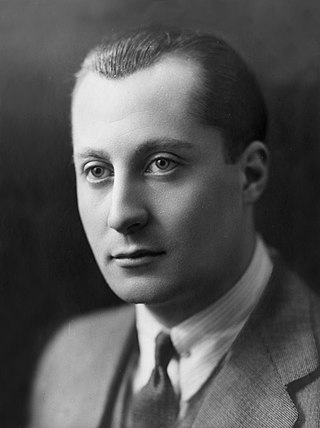
José Antonio Primo de Rivera y Sáenz de Heredia, 1st Duke of Primo de Rivera, 3rd Marquess of Estella GE, often referred to simply as José Antonio, was a Spanish fascist politician who founded the Falange Española, later Falange Española de las JONS.
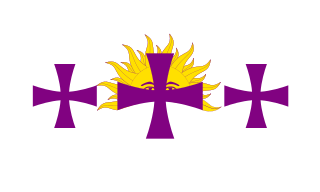
Hispanidad is a Spanish term describing a shared cultural, linguistic, or political identity among speakers of the Spanish language or members of the Hispanic diaspora. The term can have various, different implications and meanings depending on the regional, socio-political, or cultural context in which it is used.

The Falange Española Tradicionalista y de las Juntas de Ofensiva Nacional Sindicalista, frequently shortened to just "FET", was the sole legal party of the Francoist regime in Spain. It was created by General Francisco Franco in 1937 as a merger of the fascist Falange Española de las JONS with the monarchist neo-absolutist and integralist Catholic Traditionalist Communion belonging to the Carlist movement. In addition to the resemblance of names, the party formally retained most of the platform of FE de las JONS and a similar inner structure. In force until April 1977, it was rebranded as the Movimiento Nacional in 1958.
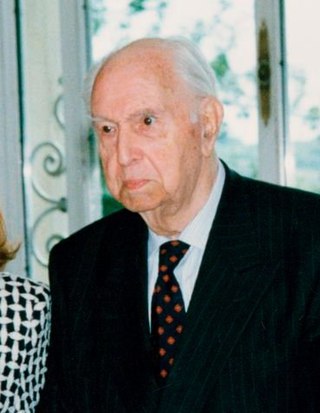
Pedro Laín Entralgo was a Spanish physician, historian, author and philosopher. He worked, fundamentally, on medical history and anthropology.
Ernesto Giménez Caballero, also known as Gecé, was a Spanish writer, diplomat, and pioneer of Fascism in Spain. Director and founder of the avant-garde magazine La Gaceta Literaria (1927–1932), his work has been categorized as being part of the Futurist and Surrealist movement, while Stanley G. Payne has described him as the Spanish Gabriele d'Annunzio.

The creation of the tradition of the political community of Spaniards as common destiny over other communities has been argued to trace back to the Cortes of Cádiz. From 1812 on, revisiting the previous history of Spain, Spanish liberalism tended to take for granted the national conscience and the Spanish nation.

Gabriel Arias–Salgado Montalvo was a Spanish politician of Falangist ideology, who held positions during the Franco dictatorship.
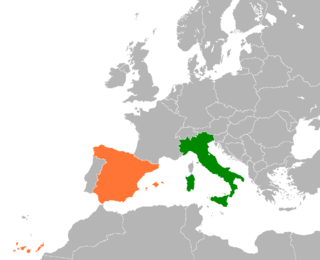
Italy–Spain relations are the interstate relations between Italy and Spain. Both countries established diplomatic relations some time after the unification of Italy in 1860.
This is a list of Spanish television related events from 1965.

José Solís Ruiz was a Spanish politician, known for his role in Francoist Spain, during which he occupied a number of important posts.
Arriba España was a Spanish newspaper published in Pamplona during the Spanish Civil War and in Francoist Spain, within the Prensa del Movimiento. The name of the publication came from the cry ¡Arriba España!, a motto that was associated with the Falangist ideology. In its early days, it coined the motto Por Dios y el César.
In the history of Spain, the White Terror was the series of assassinations realized by the Nationalist faction during the Spanish Civil War (1936–1939), and during the first nine years of the régime of General Francisco Franco. Thousands of victims are buried in hundreds of unmarked common graves, more than 600 in Andalusia alone. The largest of these is the common grave at San Rafael cemetery on the outskirts of Málaga. The Association for the Recovery of Historical Memory says that the number of disappeared is over 35,000.

Fernando José "Ferran" Gallego Margaleff is a Spanish historian and writer.
The Movimiento Español Sindicalista (MES) was a Spanish far-right political movement and predecessor of the Falange Española.
The history of the far-right in Spain dates back to at least the 1800s and refers to any manifestation of far-right politics in Spain. Individuals and organizations associated with the far-right in Spain often employ reactionary traditionalism, religious fundamentalism, corporate Catholicism, and fascism in their ideological practice. In the case of Spain, according to historian Pedro Carlos González Cuevas, the predominance of Catholicism played an essential role in the suppression of external political innovations such as Social Darwinism, positivism, and vitalism in Spanish far-right politics.
Julio Gil Pecharromán is a Spanish historian, specialising in the political history of 20th-century Spain.
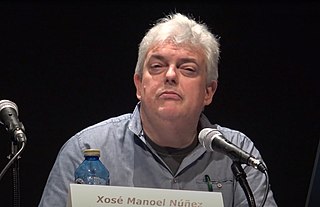
Xosé Manoel Núñez Seixas is a Spanish historian who specializes in nationalism studies, the cultural history of war and violence, and migration studies.
Libertad was a Spanish newspaper published in Valladolid between 1931 and 1979. Originally founded by the fascist leader Onésimo Redondo as a weekly of fascist, pro-Nazi and anti-Semitic ideology, during the Civil War it became a daily newspaper. It continued to be published until its disappearance in 1979, after the end of the Franco regime.

Álvaro Alcalá-Galiano y Osma was a Spanish writer, literary critic, historian, and journalist, frequent contributor to newspaper ABC and magazine Acción Española. As a monarchist, he was influenced by Charles Maurras. While he was pro-Allied during the First World War, his writings later extolled Italian fascism and spread anti-Semitic conspiracy theories and a strong anti-communism sentiment. He was a member of Spanish Renovation during the Second Republic and was executed at the beginning of the civil war in the Republican zone due to his support for the coup and his fascist ideology.











